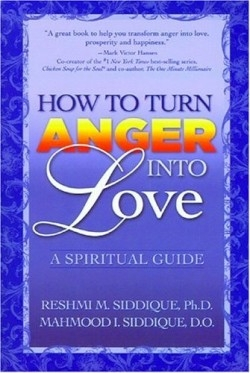How to Turn Anger into Love
A Spiritual Guide
We live in an angry world. In a new approach to a misunderstood emotion, the authors focus on decoding anger’s messages and exploring the possibility that anger, mindfully used, can be a tool for growth into higher realms.
Reshmi Siddique is a psychiatric research scientist who has published widely on medical issues; her husband is a physician and clinical assistant professor of medicine at Robert Wood Johnson Medical School. In this book (their first), they examine the health effects of anger. The role of rage in cancer, asthma, stroke, insomnia, depression, and cardiovascular disease is gaining attention, and the studies cited support the growing interest. The Siddiques explain ways that anger can be channeled toward positive, healing activities, with a particular focus on connecting with “Infinite Intelligence.” It’s unusual to find anger and spirituality explored in tandem, and the combination finds an effective, if simplified, presentation here. “Anger can act as a pathway to the core of our souls, which is unconditional love,” posit the authors.
In part two, they outline some possibilities for using anger to find healing and love, clarifying how and why anger can “alert you that you need to do spiritual work on yourself.” Concepts like taking responsibility, building self-esteem, freeing oneself from serious and subtle addictions, recognizing prosperity, achieving balance, growing creatively, expressing compassion, and being in the moment all present possibilities for transforming anger.
The third part of the book draws on practical concepts to accomplish these goals by incorporating mindful practices into a daily routine. The authors recommend asking questions to access the lesson behind the anger. Meditation is an important strategy, and affirmations are suggested, although some readers may be put off by the oversimplified approach. Giving feedback when angry, forgiving, practicing daily kindness, getting proper rest, and managing anger with children all play a part. The “Anger Management Checklist,” practical tips, and anecdotes help the suggestions come alive.
Specific cause-and-effect situations from the authors’ experiences may stretch readers’ credibility, and some may wish for more depth in the practical tools. Still, the authors caution that “Until we learn the spiritual lessons contained in the seed of anger, events and situations that sprout anger will continue to appear.”
Highlighting the concept that outward imbalances are reflections of inner issues, this book’s unique focus stems from “persuading your mind to believe that you are part of one, divine energy” while “gaining knowledge of…divinity through scientific information.” It’s a unique and useful perspective for self-help shelves.
Reviewed by
Bobbye Middendorf
Disclosure: This article is not an endorsement, but a review. The publisher of this book provided free copies of the book to have their book reviewed by a professional reviewer. No fee was paid by the publisher for this review. Foreword Reviews only recommends books that we love. Foreword Magazine, Inc. is disclosing this in accordance with the Federal Trade Commission’s 16 CFR, Part 255.

